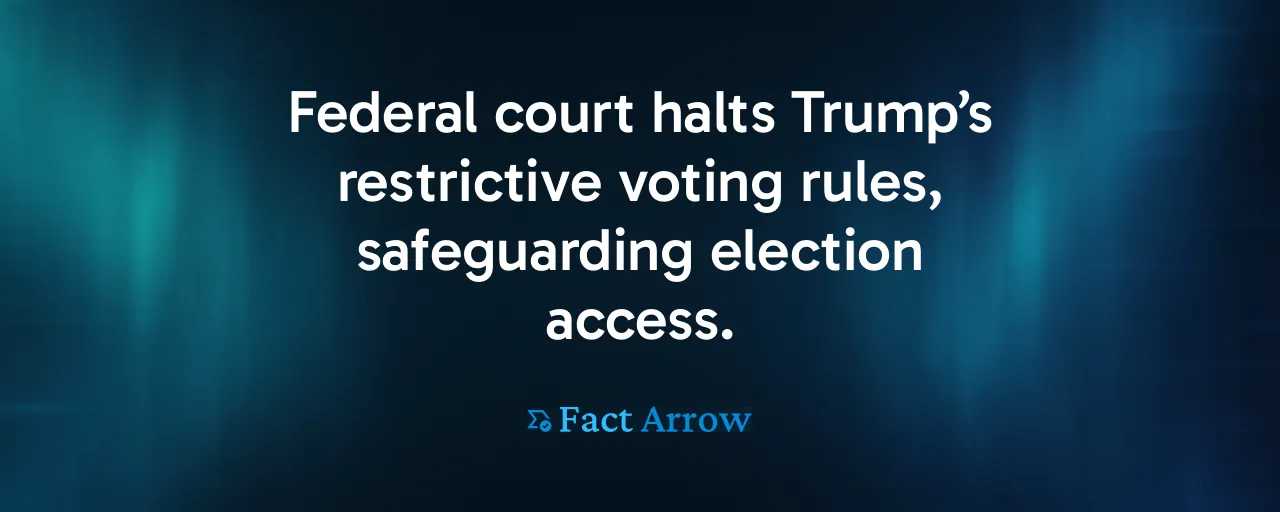A Stand for Your Voice
On June 13, 2025, a Massachusetts federal court struck a blow for democracy, halting President Donald Trump's audacious attempt to rewrite America's election rules. His March 2025 executive order sought to impose strict national voting mandates, including proof-of-citizenship requirements and inflexible ballot deadlines. This ruling, driven by a coalition of 19 state attorneys general led by California's Rob Bonta, protects the sacred right to vote from executive overreach.
The court's decision resonates deeply. Voting is the cornerstone of our nation, a hard-won right that defines who we are. Trump's order aimed to centralize power, undermining states' constitutional role in managing elections. By stopping it, the court reaffirmed a truth: democracy flourishes when local communities shape how we vote. This power rests with local communities. Why does this victory matter? It's a firewall against efforts to silence millions.
This fight began when Trump's order emerged unexpectedly, cloaked in claims of 'election integrity.' Its real intent was clear: to restrict access and tilt the playing field. The 19 attorneys general, representing states from coast to coast, challenged this power grab, proving that collective action can shield our democratic foundations. Their success is a beacon of hope in turbulent times.
Barriers Masquerading as Safeguards
Trump's executive order promised to secure elections. It also erected obstacles for voters. It demanded documentary proof of citizenship, a requirement that could exclude up to 20 million eligible Americans who lack immediate access to documents like passports, according to the Brennan Center. It also enforced a rigid Election Day cutoff for ballot counting, disregarding the needs of overseas voters and those using mail ballots.
These measures drew heavily from the Heritage Foundation's Project 2025, a blueprint for expanding executive control. Advocates, including election lawyer Cleta Mitchell, insist such rules prevent non-citizen voting. Data shows a different reality: since 2016, fewer than 40 federal cases involved non-citizen voting. The threat is negligible. The impact of these restrictions would be massive, disproportionately affecting marginalized communities.
Worse, the order sought to punish states that resisted by threatening to cut federal funds. This coercion targeted local election officials, 38 percent of whom faced threats in 2024, per the ACLU. Such tactics erode democracy, creating a climate of fear and exclusion that we reject outright.
States as Guardians of Democracy
The Constitution entrusts states with primary authority over elections, a system rooted in 7,000 local jurisdictions that reflect diverse community needs. Since 2020, states have enacted nearly 900 election laws, balancing accessibility with security through measures like online registration and post-election audits. This flexibility is a strength, allowing democracy to adapt to local realities.
Trump's order aimed to dismantle this structure, overriding the Elections Clause and imposing a uniform system that ignored state autonomy. The coalition of attorneys general argued persuasively that such federal intrusion violates the principles of federalism. Their court victory underscores a vital point: states are best equipped to protect voting rights and ensure fair elections.
Some, including House Republicans who backed the SAVE Act in April 2025, claim national standards would boost public confidence. Confidence comes from empowering voters. States already lead the way with transparent, inclusive policies. Centralizing power in Washington risks alienating the very people elections serve.
The Battle Continues
This ruling marks progress. The struggle to protect voting rights persists. The Department of Justice has appealed, and legal scholars anticipate a Supreme Court showdown in 2026. Meanwhile, states like Arizona and Louisiana have adopted citizenship-proof laws, which courts have partially struck down for violating federal voting protections. These laws reduce registrations, especially among naturalized citizens, by up to 7 percent, studies show.
Civil rights organizations, including the NAACP and ACLU, are countering with lawsuits and a $25 million campaign to combat disinformation about non-citizen voting. Their efforts remind us that democracy requires active defense. Every citizen can contribute, by voting, advocating, or supporting fair election practices. What is at risk is equal access to the ballot.
The court's decision is a powerful affirmation of democratic principles. Vigilance remains essential. As legal battles and state-level restrictions intensify, we stand united. Our votes are our voices, and no executive order or restrictive law silences them. The fight for democracy demands our unwavering commitment.
